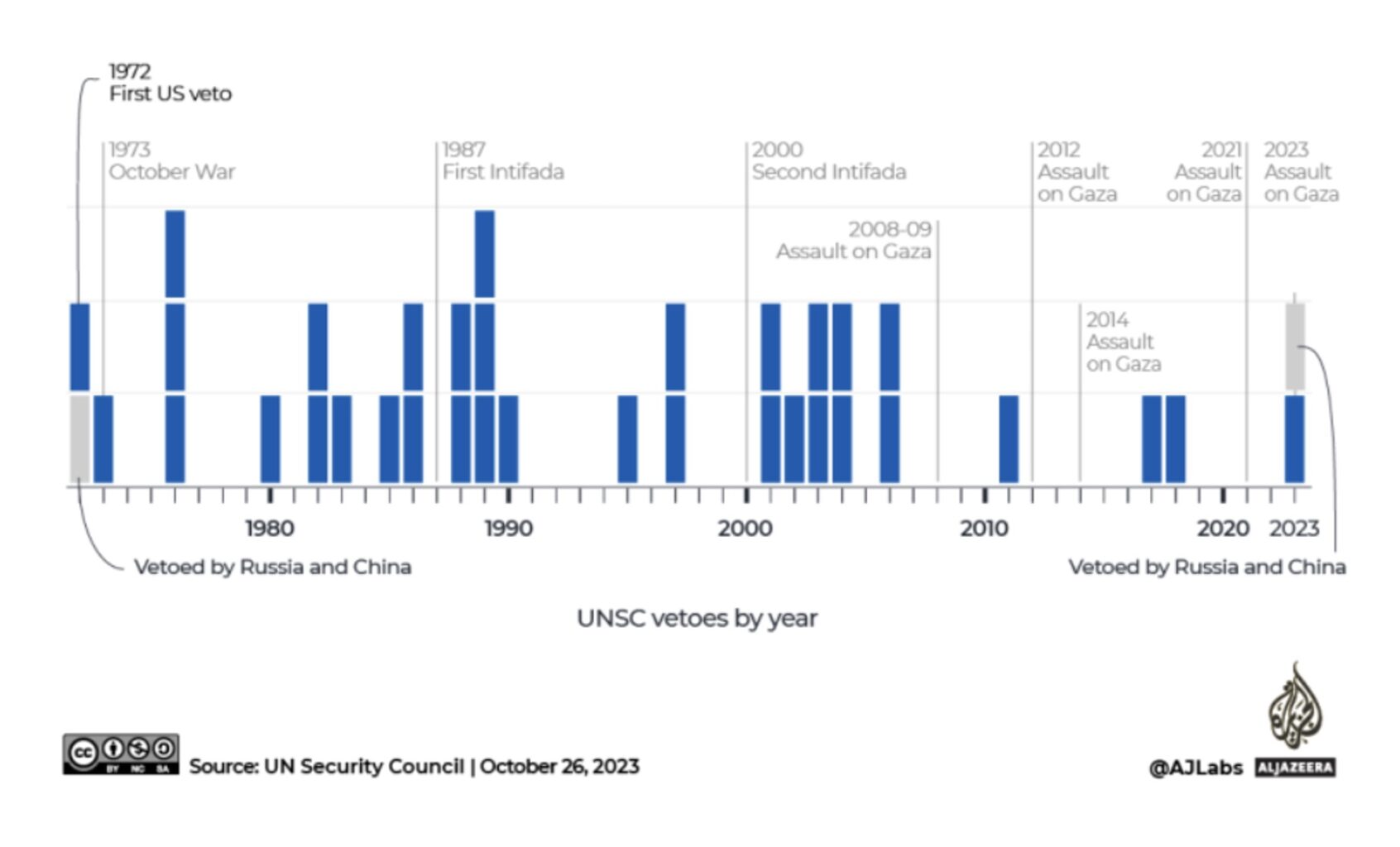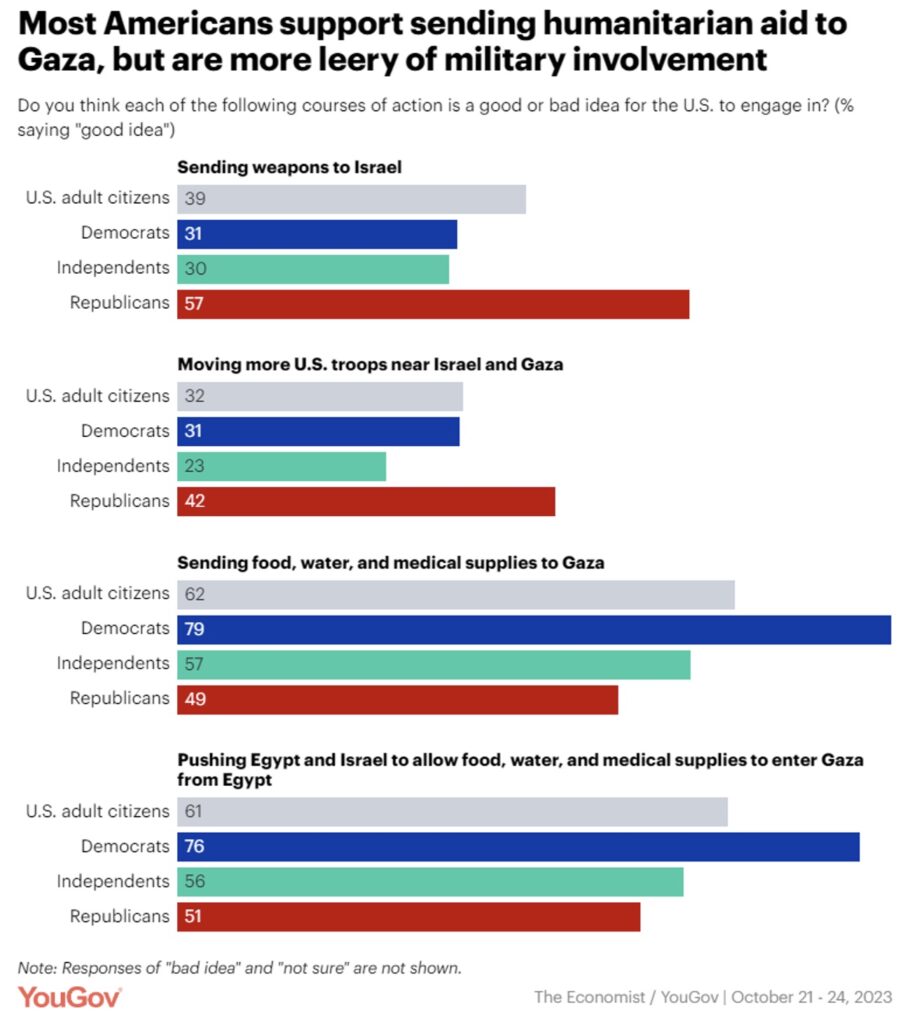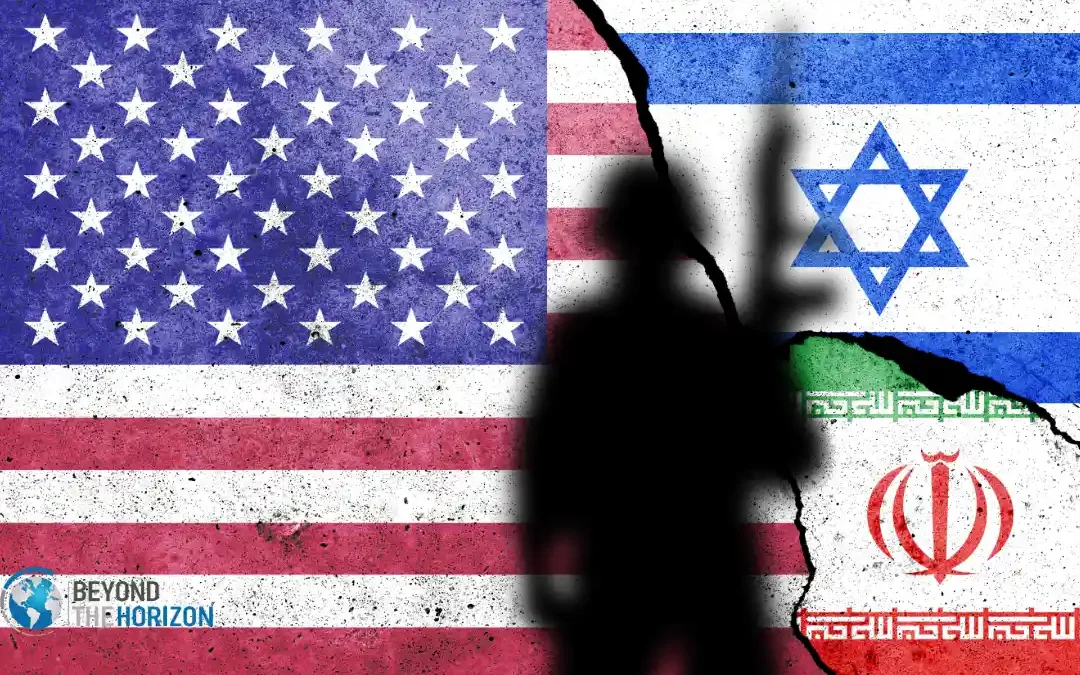Introduction
The situation in Israel and the Gaza Strip is tense. Although there have been numerous attacks in Israel, the present situation appears to be much more extensive than in the past. Coming to the aid of its ally, the United States has sent military forces to inhibit other nations from considering expanding the conflict.
The U.S. has a history of support for Israel, allowing the nation to continue its national defense. Having experienced a tragedy of their own, the U.S. is sympathetic to Israel. However, the people are divided on the issue. In recent years, a shift has begun to diverge from the cohesive Israel support, to recognizing the lack of dichotomy on the issue.
The United States’ Role
On the global stage, many wish to hold Israel accountable, but the United States has been one of Israel’s most prominent allies. Since its inception as a nation in 1945 and subsequent conflicts, the U.S. has vetoed UNSC Resolutions on behalf of Israel 46 times, to include 34 vetoes surrounding the Israel-Palestine conflict. This involvement has spared Israel from facing broad condemnation for violation of international laws. In its veto, the U.S. champions Israel’s right for defense and demands that their side of the story be heard.
 Source: Al Jazeera
Source: Al Jazeera
Following the attack on October 7th, President Biden flew to Israel to show solidarity with Israel and to confer with Prime Minister Benjamin Netanyahu. President Biden extended his sympathies to Israel and recounted the emotions that the American people felt after the 9/11 attacks https://www.whitehouse.gov/briefing-room/speeches-remarks/2023/10/18/remarks-by-president-biden-on-the-october-7th-terrorist-attacks-and-the-resilience-of-the-state-of-israel-and-its-people-tel-aviv-israel/. After equating the attack as Israel’s own 9/11, Biden beseeched Prime Minister Netanyahu to learn from America’s mistakes.
As the leader who removed U.S. troops from Afghanistan and ended a decades-long war, Biden imparted lessons learned to the Prime Minister. Biden understood that the nation was deeply angered and would want justice. As Israel views Hezbollah to their as a more sinister threat, support of a pre-emptive strike has been expressed. The Israeli Defense Minister proposed such an act but was ultimately vetoed. Experts, such as the CIA, have expressed how difficult it would be for Israel to conduct a two-front war.
As the conflict has taken a toll on innocent people in Gaza, Biden has implored Israel to allow humanitarian trucks into Gaza. These trucks will provide much-needed food, water, and medical assistance to the suffering people. However, the U.N. estimates place the efforts at 10% of what is needed to provide sufficient care.
In a national address, President Biden briefed the American people of the evolving situation. He emphasized that the war was being waged by Hamas and that Palestinians are victims of the organization’s cruelty. Furthermore, Biden expressed that terrorists and dictators alike must face consequences, to secure global peace. These remarks were made to the American people to explain that support for Ukraine and Israel was in the United States’ security interest.
The bill remains on the docket while political factions in Congress try to consolidate and exert influence. Former Speaker of the House Kevin McCarthy was ousted after the start of the new fiscal year by the conservative Republicans for failure to address issues brought up by the GOP regarding the national budget. The point of contention surrounds conservatives’ reluctance for indefinite aid to Ukraine.
As the newly established Speaker of the House, Mike Johnson is attempting to push through a narrow revision on Biden’s security package, which would provide $14.3 billion in military support for Israel. This revisions removes the support for Ukraine from the larger package and aims to receive its funding from the IRS budget. This bill is expected to fail, especially as Democrats and other Republicans favor Biden’s original proposition. However, Speaker Johnson has managed to pass his bill through the House, and it now awaits Senate approval.
Meanwhile, the U.S. is supporting Israel through its military presence in the region. The aircraft carrier USS Gerald R. Ford has been deployed to the region, along with other warships and an additional carrier en route. These ships serve as a warning to other nations not to get involved as fears of broader conflict mount.
While deployed to the area, a U.S. Navy ship has intercepted missiles and drones fired out of Yemen, presumed to go to Israel. Similarly, an anti-tank missile was fired from Lebanon into Israel, wounding three people. Additionally, there is continual border fighting between the two nations, resulting in 5 dead Hezbollah fighters.
The common link among all the hostilities toward Israel is Iran. Former U.S. ambassador to Israel, Martin Indyk, suggested that the attack on Israel could be a coordinated effort between Hamas and Iran to disrupt regional dialogue. Suadi Arabia has considered a friendlier relationship with Israel while receiving defense guarantees from the U.S. The United States has also pushed Israel to compromise with the Palestinian Authority, a group which could threaten Hamas’ authority.
While the U.S. pledges support to Israel, Iran threatens the U.S. in their involvement. Since Hamas attacked Israel, Iranian-backed militants have conducted drone attacks on U.S. bases in Syria and Iraq. These attacks serve as a warning for the U.S. to refrain from taking direct action with Israel.
Driving the idea home was a video released by a Hezbollah supporter. In his video, Haj Mohammed cites the Beirut attack on U.S. Marines as a potential outcome for further U.S. involvement in the war. Secretary of State Anthony Blinken and Defense Secretary Lloyd Austin said that America is prepared to fight regarding the various threats.
Back in the States, the issue of war in Israel is divided along party lines, with Republicans tending to support Israel and Democrats sympathizing with Palestinians. However, following the attacks on Israel, most Americans believed Israel held justification to respond to the violence, with 60% of Americans favoring airstrikes as an appropriate response.
Nevertheless, as time goes on, the initial unified support begins to wane. Republicans reflects a higher percentage of support for military supply to Israel than other political parties. Republicans favor humanitarian actions over military support, but Democrats and Independents lead the polls as the majority group on this issue.

Source: YouGov
The division of support for Israel can be described by the political and generational division in American politics. Americans that are from the Millennial generation have seen a dramatic shift in sympathy. In 2016, Millennials represented about 30% of Americans who shared sympathy with Israel, contrasting than the views of older generations which was as high as 60%. In the years following, Millennials have decidedly switched sympathies, showing a slight inclination, about 5%, toward Palestine. Likewise, Democrat voters have experienced a mirrored shift on the Israel and Palestine conflict.
Such a shift has been attributed to the fact that younger people and those who align on the left tend to sympathize for the marginalized groups. As of November 1, 18 members of Congress have signed a resolution to call for a ceasefire. This follows the growing unsettlement of the war in Israel amongst the younger generation and progressive Democrats. As more civilians face death from attacks conducted by both sides, this group of Americans want change. Decades of keeping the status quo have sullied the optimism of this political faction, which equates the dealings of Israel to apartheid.
Conclusion
The conflict in Israel has rapidly evolved from a war between Hamas and Israel to threats of a broader conflict. The U.S. has guaranteed support for Israel amidst the increasing hostilities. As a result of this support, Iran intimidates the U.S. directly and through its proxies to stay away. The U.S. will assist its ally, and the American people believe this path will maintain security in the Middle East.
Yet, the situation in the United States is complex. Internal political division stands in the way of achieving tangible support. With fatigue in supporting Ukraine developing amongst the conservative right, political posturing is restricting legislative resolutions from passing without delay. Likewise, a similar divergence seen on the opposite side of the aisle may mean that support for Israel will be impacted. Despite growing internal strife, the U.S. intends on maintaining its support for Israel during these troubling times.
Joshua Perkins is a research assistant intern at Beyond the Horizon ISSG. He is also pursuing a degree in Homeland Security with an emphasis in International Relations through Embry-Riddle Aeronautical University.

